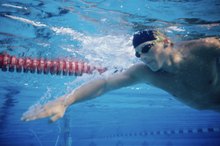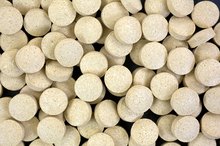What does fact checked mean?
At Healthfully, we strive to deliver objective content that is accurate and up-to-date. Our team periodically reviews articles in order to ensure content quality. The sources cited below consist of evidence from peer-reviewed journals, prominent medical organizations, academic associations, and government data.
The information contained on this site is for informational purposes only, and should not be used as a substitute for the advice of a professional health care provider. Please check with the appropriate physician regarding health questions and concerns. Although we strive to deliver accurate and up-to-date information, no guarantee to that effect is made.
Gas After Swimming
Passing gas is a sign of a normally functioning digestive system, and what seems excessive might be well within the range of normal. If you pass gas during or after swimming, you can help prevent and treat untimely flatulence with changes in your dietary habits and swimming routine.
If you are experiencing serious medical symptoms, seek emergency treatment immediately.
We All Do It
The average person passes gas upwards of 14 times daily, reports the Johns Hopkins website 1. Passing gas in the pool or shower after you swim might make you more aware of the fact that it happens; especially if the gas escapes in the presence of other people, causing you to feel embarrassed. In addition to passing gas after you swim, you might also notice additional symptoms such as abdominal bloating or pain.
The Air You Breathe
Swimming With a Cough
Learn More
Swallowing air when you swim, especially if you swim at a vigorous pace, could cause you to develop excessive gas afterwards. Eating quickly or chewing gum before you swim, or wearing loose dentures can also cause you to develop flatulence. Certain types of foods are known to cause gas in some individuals. After eating these difficult-to-digest foods, your body might produce excess gas after you swim. Difficulty digesting gluten or lactose can also cause you to experience gas, especially if you swim after eating a meal containing these nutrients.
- Swallowing air when you swim, especially if you swim at a vigorous pace, could cause you to develop excessive gas afterwards.
- Difficulty digesting gluten or lactose can also cause you to experience gas, especially if you swim after eating a meal containing these nutrients.
Gas Be Gone
Regular exercise, including swimming, can help gas pass from your body more quickly, explains the Johns Hopkins website 1. Adding some abdominal exercises or changing your swimming routine to focus on strokes such as the backstroke can help strengthen your abdominal muscles, thereby reducing excess gas, advises the website. Swimming with your face toward the sky rather than facing the water might also help reduce the amount of water and air you swallow while swimming, also decreasing the amount of gas your body produces. Your doctor might recommend an over-the-counter medication to take before you swim.
- Regular exercise, including swimming, can help gas pass from your body more quickly, explains the Johns Hopkins website 1.
- Adding some abdominal exercises or changing your swimming routine to focus on strokes such as the backstroke can help strengthen your abdominal muscles, thereby reducing excess gas, advises the website.
No Triggers
Sore Throat After Swimming in a Lake
Learn More
Keep track of foods that seem to trigger excessive gas, and avoid eating them before you swim. Check with your doctor to see if over-the-counter gas prevention remedies might help prevent you from developing gas after eating certain types of foods, especially if you prefer swimming after you eat a meal. If you wear dentures, removing your dentures before you swim might also help prevent you from experiencing gas, advises the National Institute of Diabetes and Digestive and Kidney Diseases website.
Related Articles
References
- Johns Hopkins Health Alerts: You've Got Gas
- National Institute of Diabetes and Digestive and Kidney Diseases. Diabetes, heart disease, and stroke. Updated February 2017.
- Mohr M, Nordsborg NB, Lindenskov A, et al. High-intensity intermittent swimming improves cardiovascular health status for women with mild hypertension. Biomed Res Int. 2014;2014:728289. doi:10.1155/2014/728289
- Wing RR, Lang W, Wadden TA, et al. Look AHEAD Research Group. Benefits of modest weight loss in improving cardiovascular risk factors in overweight and obese individuals with type 2 diabetes. Diabetes Care. 2011 Jul 1;34(7):1481-1486. doi:10.2337/dc10-2415
- Erickson ML, Jenkins NT, McCully KK. Exercise after you eat: Hitting the postprandial glucose target. Front Endocrinol (Lausanne). 2017;8:228. 2017 Sep 19. doi:10.3389/fendo.2017.00228
- Colberg SR, Sigal RJ, Yardley JE, et al. Physical activity/exercise and diabetes: a position statement of the American Diabetes Association. Diabetes Care. 2016;39(11):2065–2079.
- National Institute of Diabetes, Digestive, and Kidney Diseases. What I need to know about physical activity and diabetes. Updated December 2016.
Writer Bio
Jessica Lietz has been writing about health-related topics since 2009. She has several years of experience in genetics research, survey design, analysis and epidemiology, working on both infectious and chronic diseases. Lietz holds a Master of Public Health in epidemiology from The Ohio State University.









